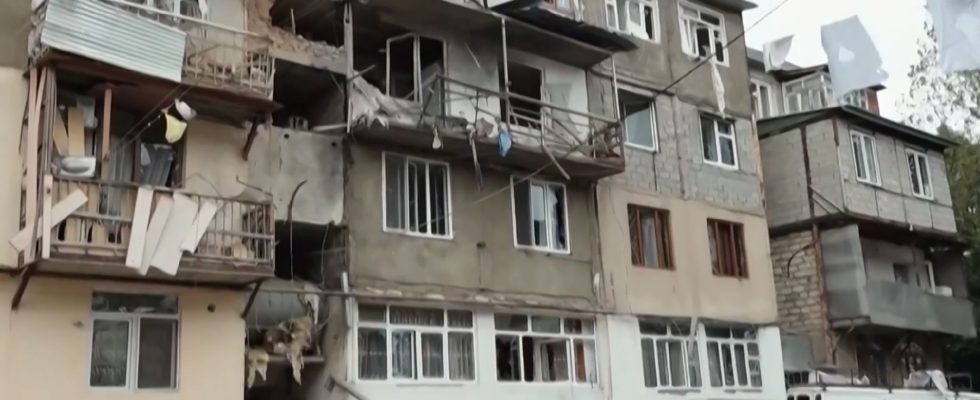On September 19, around noon, sirens rang out in Stepanakert, capital of the self-proclaimed Republic of Artsakh, the separatist enclave of Nagorno-Karabakh – the territory that Armenia and Azerbaijan have disputed for decades. They called on the inhabitants, mainly Armenians, to take shelter from the bombings, which lasted all day. Baku launched an “anti-terrorist operation” against Armenian separatists, after announcing the death of four police officers and two Azerbaijani civilians in a mine explosion in Nagorno-Karabakh.
Baku says it wants to target illegal military infrastructure in Nagorno-Karabakh and spare civilians. But the observers on site are already reporting a very heavy human toll: at least 32 civilians are believed to have died in one day and around 200 injured, not counting the areas where communication was lost. Several villages in the enclave are now surrounded by the army, and 7,000 people from 16 localities have been displaced, according to Artsakh human rights defender Gegham Stepanyan.
As bombs rained down on Stepanakert on Tuesday September 19, Armenian Prime Minister Nikol Pashinian denounced a “large-scale attack”, specifying that his country “will not intervene[it] not militarily”. The next day, Nagorno-Karabakh authorities agreed to a ceasefire with Azerbaijan, at a suggestion from Russian peacekeepers. The conditions involve complete disarmament and disbandment of the armed forces. of the enclave, as well as discussions around the “reintegration, protection of rights and security of the Armenians of Nagorno-Karabakh” between the local population and representatives of Baku.
A very predictable attack
The situation has a bitter taste of déjà vu. Since the 1990s, the enclave has been the subject of conflicts between these two former Soviet republics in the Caucasus. After several blitzkriegs, Armenia suffered a defeat in 2020, and Azerbaijan seized almost all of Nagorno-Karabakh. Baku’s objectives are always the same: “Continue to push the Armenians present on its territory into exile to take complete control of the enclave”, explains Richard Giragosian, American-Armenian analyst specializing in the geopolitics of the Caucasus.
A new offensive by Azerbaijan has been predictable for a long time. Armenian Prime Minister Nikol Pashinian, who, during talks this year, had already made concessions by recognizing Nagorno-Karabakh as an integral part of Azerbaijan, had obtained nothing from Azeri President Ilham Aliyev. He has always refused to guarantee the security of the Armenians of Nagorno-Karabakh, believing that it was an “internal question”. International observers fear “ethnic cleansing”.
A particularly worrying sign is that for almost ten months, the road linking Armenia to Nagorno-Karabakh, the Lachin corridor, has been blocked by the Azeri military, which prevents the supply of the population, on the verge of famine. Only a few emergency workers have had access to the enclave, where 120,000 Armenians are barely surviving. Bread and diesel are becoming increasingly rare, as shown by images of endless queues in front of stores for several weeks.
“The impunity of Azerbaijan’s attacks over the last three years has left the field open to Ilham Aliyev, believes Taline Papazian, director of the Armenia Peace Initiative and teacher at Sciences po Aix. On the side of Azerbaijan, there is a certain haste to resolve the Nagorno-Karabakh issue. The country uses force, and it has the means.”
Moscow’s troubled game
The context of this new offensive is, however, different from the 2020 war, due to the deterioration of relations between Armenia and Russia. Moscow is, however, the historic ally of Yerevan, isolated between the unfriendly Turkish and Azerbaijani powers. But the Russian contingent of 2,000 peacekeepers, deployed in Nagorno-Karabakh after the 2020 ceasefire, was never able to prevent Baku’s numerous military actions. “Russia has proven its inability to maintain peace in the Caucasus, especially since it got bogged down in the war in Ukraine,” according to Richard Giragosian.
This is why, several days before the new attack, the head of the Armenian government, Nikol Pashinian, made an about-face, describing as “an error” the fact of having entrusted almost all of his territorial integrity and the security of the Upper Karabakh to Russia. He even went so far as to fully ratify the Rome Statute, which provides for arresting Vladimir Putin if he visits Armenia. An irritating posture for Moscow, because it signals the beginnings of a rapprochement between Armenia and the West.
For its part, the Russian Foreign Ministry was content to condemn the escalation between the two countries, and admitted having been informed of “the operations” carried out by Baku shortly before their start. “For a power supposed to maintain peace and protect the lives of Armenians in the Nagorno-Karabakh region, this reaction can only raise questions,” explains Taline Papazian, who does not exclude the possibility that Baku received “silent assent ” from Moscow to launch its new attack.
Western support in question
Yerevan can, in theory, only rely on the West to help it ensure the security of the population of Nagorno-Karabakh. “This situation at least has the advantage of clarifying the situation,” analyzes Richard Giragosian. “From now on, if we let Azerbaijan do its thing, it is a dangerous admission of weakness by the West in the face of Russia!”
“Western support for the Armenians of Nagorno-Karabakh will not go beyond words. And if an attack occurred against Armenia itself, it would be alone in practice,” puts Taline Papazian into perspective, adding: “The West will not does not wish to commit to an entity [le Haut-Karabakh] which it considers legally part of Azerbaijan. Only the humanitarian aspect is today taken into account by the international community, and in a restricted sense. The States want a so-called ‘reasonable’ solution to this conflict, without bloodshed.” Abandoned by everyone, Nagorno-Karabakh, a separatist territory not recognized internationally, has never been so close to total integration with Azerbaijan .
